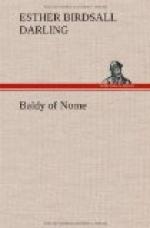“That had been tried constantly, with no success, and some danger. You see, with McMillan’s disposition, such treatment only made him more defiant, without in the least breaking his spirit. I knew of course that he would have to be conquered, and conquered completely, or become an outlaw against whom every one would turn; but the punishment would have to be more vital and less humiliating than a beating. It won’t do to embitter an animal any more than it will a person. You have to leave a certain self-respect and give him a fair chance.”
And more than a fair chance Jack had received in that thrilling moment when the wiry little Scotchman, cool and determined, had faced the huge brute whose nature, harking back to the wild, threw off the shackles of generations of suppression and training, and rose to meet his hereditary enemy—opposing fierce resentment to all efforts of control.
For an instant the man and dog had paused, each seeming to gauge the strength of the other—then the instinct to kill, that heritage from the past, when the timber wolf gave no quarter, rose supreme; and the dog sprang forward, the wide open jaws revealing his sharp, white teeth and cruelly broken tusks. Suddenly the weight of Allan’s body was hurled against him; strong supple fingers closed upon his neck, and with an unexpected wrench Jack McMillan’s head was buried in a drift of soft, deep snow. He struggled violently to wrest himself from the iron grasp; madly he fought for freedom; but always there was that slow, deadly tightening at the throat. Panting and choking, he had made one last desperate attempt to break the grip that pinned him down; and then lay spent and inert except for an occasional hoarse gasp, or convulsive movement of his massive frame.
At length the man had risen, and the dog, feeling himself loosed, and able to get his breath, staggered uncertainly to his feet, turned, and stood bravely facing his foe. There was, for a brief period, the suggestion of a renewed conflict in the dog’s attitude. With the foam dripping from his mouth, quivering in every muscle; but still erect, exhausted but not cowed, he waited for the next move—and when it came McMillan had met his master. Not because of the force in the vise-like fingers, not because of the dominating mind that controlled them, but because of the generous spirit that treats a conquered enemy—even a dog—as an honorable antagonist, not an abject slave.
There had seemed to be a sudden comprehension on the part of the dog, like the clearing of a distorting mist. He realized in the tone of the man’s voice the recognition and appreciation of qualities which stand not alone for unquenchable hatred, but for undying fidelity as well; and when “Scotty’s” hand fell upon his head, and gently stroked the soft sable muzzle, Jack McMillan had not only met a master, but he had made a friend.




